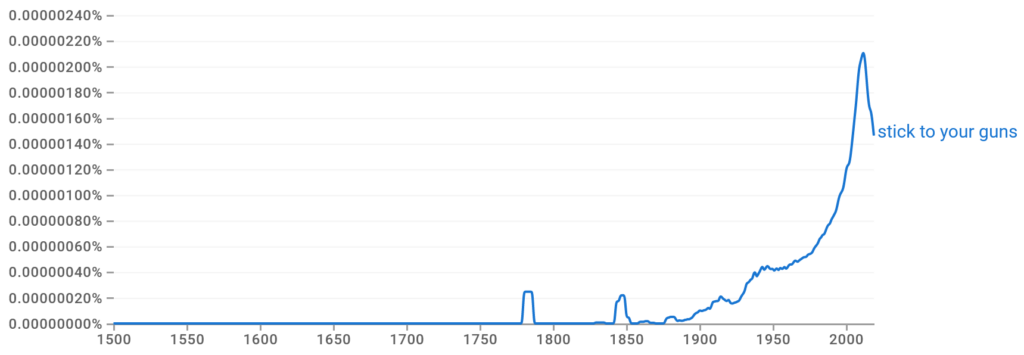To stick to your guns means to maintain your position or opinion firmly despite opposition or criticism. All idioms are metaphorical expressions, and this one underlines the importance of staying true to your beliefs or decisions, even when faced with pressure to do otherwise.
Idiomatic expressions like stick to your guns are phrases or sayings that mean something different from the literal words used. These expressions are commonly used in English, adding color and conveying meanings that may not be clear from the individual words’ literal definitions. They often carry cultural or contextual significance and contribute to the richness of language.
In this article, I’ll get into the meaning, origin, and different uses of this fascinating phrase. I’ll also provide sentence examples, variations, and tips for effectively using the idiom. There’s even a quiz at the end you can take to test your knowledge. Let’s get to it!

What Does the Idiom Stick to Your Guns Mean?
The idiom stick to your guns means to firmly and confidently maintain one’s position, opinions, or decisions, especially in the face of opposition or challenges. It’s a specific phrase that implies unwavering resolve in the face of adversity. It’s used to encourage someone to remain firm in their beliefs, even when it’s difficult or unpopular to do so.
The Cambridge Dictionary elaborates on that, stating that it means “to continue to have your beliefs or continue with a plan of action, even if other people disagree with you.” This phrase often appears in situations where moral conviction or personal principles are tested.
I once got in a huge fight with someone because they claimed that listening to audiobooks didn’t count as reading. Now, as an author with my books in every digestible format you can think of, I firmly stand behind the fact that audiobooks are indeed books and, therefore, listening to them is a form of reading. I guess you could say I’m sticking to my guns on that opinion.
Literal Meaning vs. Figurative Meaning
The literal meaning of stick to your guns might give you a mental image of someone physically clinging to firearms, but this isn’t its intended meaning. In the figurative sense, the idiom suggests standing firmly like a soldier holding the line, metaphorically sticking to one’s guns as a symbol of resolve and determination.
Variations of the idiom
Stick to your guns is the most recognized form, but there are other variations used around the world. Different cultures and regional preferences always come into play, mixing up how certain phrases are spoken.
- Stand to your guns
- Sticking to your guns
- Stuck to your guns
- Stick by your guns
These variations keep the core meaning intact but may be used in slightly different contexts or styles of speech.
How Is Stick to Your Guns Commonly Used in Context?
This English language idiom frequently pops up in contexts where perseverance and determination are central themes. It’s particularly common in discussions about personal values, business decisions, or moral dilemmas. Consider the following sections I whipped up to give you a better idea of how to use the phrase:
What Are the Different Ways to Use the Idiom Stick to Your Guns?
- In professional settings: When talking about the need to maintain a business strategy, even under pressure. “Despite what our competitors are doing, we have to stick to our guns on this new marketing plan.”
- Personal beliefs: In situations where someone is urged to stay true to their beliefs or opinions. “Forget what everyone else says. I respect your religious beliefs, and you should stick to your guns at work.”
- Political contexts: Use it to describe a politician who remains steadfast in their policies or promises, regardless of opposition or criticism. “Wow, the senator’s sticking to his guns even after that scandal broke?”
What Are Some Tips for Using the Idiom Stick to Your Guns Effectively?
- You can use it to encourage resilience and steadfastness, especially in challenging situations.
- It works best in contexts where maintaining a specific stance or decision is crucial.
- Be cautious in situations where flexibility or compromise is more beneficial because the phrase might imply stubbornness, which could offend others.
Where Can You Find Examples of the Idiom Stick to Your Guns?
Stick to your guns is a staple in different forms of media, including films, literature, and political discourse. It highlights characters or individuals who are unwavering in their beliefs or decisions.
One of my favorite metalcore bands from the States is aptly called “Stick to Your Guns.” And who could forget the 1988 banger “Stick to Your Guns” by Bon Jovi? The lyrics said, “You got to make ’em all believe it. If you’re gonna be the one, whoa. Stick to your guns. Ain’t nobody gonna hurt you, baby.”
Also, I love the quote by author Lori Goodwin where she says, “It’s one thing to stick to your guns. It’s quite another to hold those guns to the heads of your citizens.”
Of course, it’s a common phrase that’s often quoted in news and media, like these few examples:
“When it becomes an attempt to creep on turf, we believe the best option is to call the bluff of the Executive, assert the independence, stick to one’s guns and proceed with one’s mandate.” (Pulse Ghana)
But it is commendable to stick to one’s guns and create something genuine and heartfelt rather than jumping on the bandwagon and succumbing to the pressures of music labels. (The Hindu)
What Is the Origin of the Idiom Stick to Your Guns?

The idiom stick to your guns originated as a military command, urging soldiers (specifically sailors on warships) to hold their position and not retreat, even if they’re taken over.
The idiom first appeared in military contexts in the 17th and 18th centuries. The phrase likely evolved from literal commands given to soldiers or sailors during battles to maintain their positions and keep fighting.
How Did the Idiom Evolve Over Time?
The expression stick to your guns transcended its literal military origins to become a popular metaphor for maintaining your position or beliefs in any challenging situation. It’s easy to see where the literal and figurative meanings overlap.
What Are Some Related Terms to Stick to Your Guns?
Use synonyms to switch things up and avoid repetitiveness, or use antonyms when you want to convey the opposite meaning.

Synonyms
- Holdfast
- Stand firm
- Dig in your heels
- Stand your ground
- Remain steadfast
Antonyms
- Back down
- Yield
- Give in
- Push over
Stick to Your Guns: Test Your Knowledge!
Choose the correct answer.
What Have We Learned About Stick to Your Guns?
To stick to your guns means to advocate for the power of conviction and the importance of standing firm in your beliefs. Idioms are simple on the surface, but they hold such an essential part in the English language by giving us so many ways to communicate our big ol’ ideas.
I went over the details of its meaning and origin, gave you some variations and alternatives, and then shared a few examples from modern-day media. With all this info, you should be all set to start using this phrase any time!
Now, before you go, be sure to read a few more of my idiomatic guides found right here on Grammarist!
